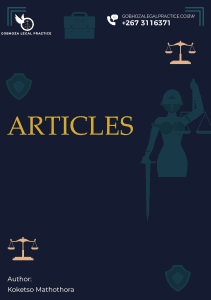-
INTRODUCTION
The Covid-19 pandemic has impacted negatively on all economies worldwide and Botswana has not been spared. In the current recovery phase, the government, state owned enterprises, private entities and corporations may need to borrow money to assist in the recovery process especially in completing their projects which stalled due to the Covid-19 pandemic. However, obtaining such loans involves a tedious negotiation process which would result in a binding Agreement which is invariably drafted by lawyers. This short paper seeks to outline the role of a lawyer in project finance with specific focus on legal advice, negotiation and drafting of the agreement. It will deliberately not attempt to define the term ‘project’ because parties to a contract are free to define it as they see fit. Rather, it will start by identifying the potential sources of funding, after which it discusses the role of a lawyer at each stage of project finance. The paper will wind up with a conclusion.
-
POTENTIAL SOURCES OF FUNDING FOR PROJECT FINANCE
There are several sources for funding which the government or other public entities may deal with. The first one can be termed as intergovernmental or multilateral financial institutions. These include the World Bank Group (WBG), International Monetary Fund (IMF) and the African Development Bank (AfDB). These institutions have strict rules on who to lend to and what project to finance. Of these three institutions, the AfDB is the most liberal one in terms of having relaxed terms and conditions. In the past years, Botswana benefited from loans from both the Word Bank and the African Development Bank.
The second source is bilateral aid. Bilateral aid is assistance given by a government directly to the government of another country. It is usually the largest share of a country’s total aid and is often influenced by strategic geo-political purposes as well as humanitarian ones. For purposes hereof, nothing further need to be said about this source.
The third one is through Public Private Partnerships. A public-private partnership is a contractual arrangement between a public agency and a private sector entity. Through this agreement, the skills and assets of each sector (public and private) are shared in delivering a service or facility for the use of the general public. In addition to the sharing of resources, each party shares in the risks and rewards potential in the delivery of the service and/or facility.
Lastly, there are commercial sources of funds. This is where commercial banks lend money either through a single bank or syndicated term loan agreement. Commercial sources are profit making and their lending decisions are market driven and base their lending decisions on borrower’s ability to repay and their alternate business opportunities. This paper is predisposed on the role of a finance lawyer in this last category, though some of the aspects may apply to other categories.
-
STAGES IN PROCURING PROJECT FINANCE AND THE ROLE OF A LAWYER
There is no uniformity nor any set standards on stages in procuring project finance. In general, there is the pre-negotiation phase, the negotiation phase, and the post negotiation phase. This paper explains what each stage entails and discuss the role of a lawyer at each of these stages.
3.1 The pre-negotiation phase
During the pre-negotiation phase, the borrower identifies both the purpose for which it intends to borrow money and the sources of funds to approach. At this stage, the borrower prepares a project document which can be used to approach potential lenders in order to raise funds. Although many professionals are involved at this stage, the role of a lawyer is to conduct legal feasibility of the project. Professor DD Bradlow, a prominent scholar on international finance law, has raised four pertinent issues which a lawyer should consider during the feasibility study and these are:
- Whether the borrower has the legal capacity to undertake the activity?
- Whether the borrower needs governmental authorization to undertake the activity?
- Whether the borrower has clear title to all the property that it plans to use in the project?
- Whether there are any possible actions which can be taken by those
- who oppose the project thereby causing delays and increased costs?
The answers to the first three questions asked above are based mainly in the statutory law which defines the legal capacity of entities as well legal title to property. However, on the fourth issue (potential opposition to the project), both statutory law vis-a-vis common law and national vis-a-vis international law may be applicable. The country’s commitments under international law especially in areas like environmental law and human rights may give individuals or communities the right to oppose or challenge the project. The lawyer should also advise on how to overcome these possible actions.
The lawyer also plays an important role in advising the borrower on the legal regimes governing each of the identified sources of funds. Each lending institution has its own rules concerning access to loans. For instance, multilateral financial institutions are governed by the Articles of Agreement and their own internal operating rules and procedures. Advising the borrower on these various legal regimes relating to potential sources of funds assists the borrower in making a correct decision on choosing the most favorable source of funds. In addition, where a project document or memorandum is sent to potential sources of funds, the lawyer should advise the borrower on legal
liability of any statements or misstatements in the project document and should also advise on ways to limit the exposure of the borrower to such liability.
3.2 The negotiation phase
This is where the terms and conditions of the loan agreement are negotiated, and the agreement is drafted and signed by the parties. The lawyer should prepare the borrower for the negotiations by identifying objectives, priorities and arguments. The lawyer should also keep notes on negotiations to make sure all issues are discussed and there is record of agreements.
3.3 The post negotiation phase
After the successful negotiations, the borrower should start any internal approval process which must be done for the loan to become effective. When the loan has been approved internally by both parties and any conditions precedent are met, the disbursements would commence, and the borrower accesses the funds. The parties would deal in terms of the agreement and any dispute would be solved in accordance with the Agreement. The role of the lawyer is to provide a general oversight on the implementation of the contract and to interpret and clarify the terms of the contract to the borrower during the implementation phase.
-
CONCLUSION
This paper has discussed the intricacies of project finance for development and the central role which lawyers play. With many major projects on the card, the role of a lawyer should be indispensable. Finance lawyers should expect to be involved in these sorts of transactions more often than not. In concluding, the role of a finance lawyers was summed up succinctly in the following words:
‘A lawyer who is well versed in financial law and who has a good understanding of financial transactions can play a constructive role at each stage of the loan transaction. Borrowers who allow lawyers to function as fully fledged members of their negotiating teams will find that the value the lawyer can add to the debt team will exceed the cost, both in monetary terms and in terms of the difficult issues that the
lawyer might raise in the course of the structuring and negotiating of the transaction.’
For more information, contact us at info@gobhozalegalpractice.co.bw .
Disclaimer: This article is for information only and should not be taken as legal advice.




Leave a reply